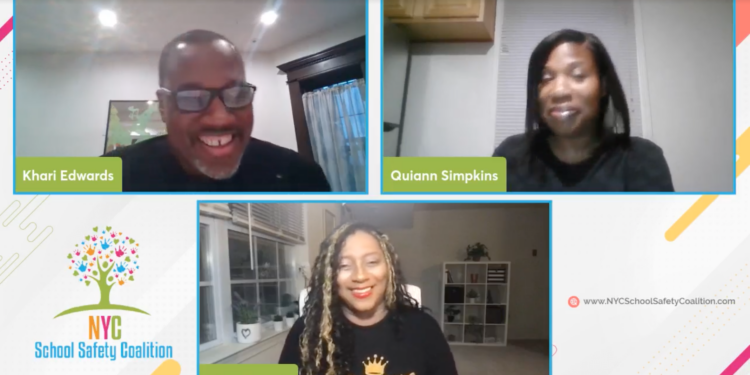Khari Edwards participated in a Facebook Live interview with the NYC School Safety Coalition, hosted by Quiann Simpkins and Mona Davids, on Sunday, March 30th. The Meet The Candidate interview has been watched by over 1200 people. He shared his vision for a more equitable and sustainable future for Brooklyn. With over 27 years of public service experience, Edwards is running for Brooklyn Borough President, focusing on improving the lives of its residents. His platform prioritizes education, healthcare, public safety, mental health, and food insecurity.
School Safety and Violence Prevention
Edwards addressed the growing violence in schools, highlighting the presence of weapons and the severe shortage of school safety agents. He pointed out that one agent often oversees hundreds of students, making it challenging to manage violent situations effectively. He called for more school safety agents and better training and resources to ensure schools remain secure for students.
Education and Funding
Edwards spoke about his plan to improve education in Brooklyn, particularly in underserved communities. He outlined his goal to visit every elementary and middle school in the borough during his first year in office to meet students and engage with teachers, administrators, and school safety agents to identify needs. He said schools in underserved communities often lack essential resources like computer labs and cooling systems. He emphasized that education is a priority for his campaign and will advocate for more funding to address infrastructure issues and improve the overall learning environment.
Mental Health and Homelessness
Edwards discussed the link between mental health and homelessness, stressing the need for more mental health support for the homeless population, which is disproportionately affected by untreated mental illness. He proposed that shelters should serve as “ecosystems of healthcare,” incorporating mental health services and job training to help individuals regain stability. This approach would focus on providing a comprehensive solution to homelessness, particularly for the working poor.
Affordable Housing and Economic Inequality
Edwards also discussed affordable housing and Brooklyn’s growing economic divide, emphasizing that rising housing costs push out long-time residents, especially working-class families. He pointed out that housing assistance programs like CityFEHPS exclude many union workers and middle-income earners, forcing some into shelters due to unaffordable rents. He stressed the need to reevaluate housing policies to expand access to affordable housing in Brooklyn. He called for changes to the city’s housing guidelines, specifically recalculating the Average Median Income (AMI) to better reflect the borough’s actual income levels.
Healthcare and Food Insecurity
Edwards addressed healthcare and food insecurity, noting that safety-net hospitals in Brooklyn are financially strained due to the high volume of Medicare and Medicaid patients. He emphasized the need to allocate resources to these hospitals to ensure they have the equipment required to care for the community, stating that hospitals should be equipped to save lives, not just manage crises. He also highlighted food insecurity, pointing out that around 250,000 people in Brooklyn go to bed hungry each night. He underlined the need for more food pantries and better infrastructure to provide food beyond immediate needs.
Youth Engagement and Violence Prevention
Edwards also emphasized the need to engage youth in positive activities to reduce violence and crime. He highlighted his past work with a Brookdale Hospital program that showed young people the real-life consequences of gun violence. He called for more programs like this in Brooklyn to help kids make better choices. Edwards also proposed creating more after-school programs and expanding recreational activities to keep young people engaged. His “Something to Do” initiative aims to open schools after hours as community centers offering sports, arts, and other activities. By providing positive outlets, Edwards believes these programs can reduce violence and help youth appreciate life, giving them opportunities to succeed and avoid crime.
Law Enforcement and Public Safety
Edwards reaffirmed his stance on the necessity of police presence in our community acknowledging law enforcement’s critical role in maintaining safety. He emphasized that while law enforcement is essential, officers must be well-trained to understand the communities they serve, mainly to reduce bias. Edwards called for ongoing training on implicit bias and better community engagement strategies to build trust between law enforcement and the people they protect.
Cell Phones in Schools
Edwards emphasized the need for a balanced approach to school cell phone usage. While recognizing the importance of communication, especially in emergencies, he also acknowledged the potential distractions that cell phones can cause in the classroom. He proposed that schools create policies allowing emergency communication while ensuring cell phones don’t interfere with students’ ability to focus and learn. Edwards stressed that finding a middle ground is essential to address safety concerns, and students must stay engaged in their education.
Conclusion
Edwards concluded the discussion by outlining his goals for Brooklyn’s future. He stated that he is running for borough president to improve the borough, ensuring every community has access to the resources needed to thrive. For more details on his policies and ways to get involved, visit his website at www.Khariedwards.com.









